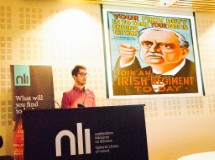I only ever came into direct contact with Ian Paisley once. It was in a second-hand book shop in Bangor. He was affable, witty and smartly dressed to the point of dapper. He quite happily passed the time of day with the customers in the shop. There was no politics or religion from him that day just an old man who was personable and charmed the shop as they all stopped to talk and chat with him. This was all in sharp contrast to the Dr No of British and Irish politics.
There will be many obituary essays written about Dr Paisley over the next few days. I do not intend this to be one of them, I will leave that to others, but there some things I think are worth considering.
In 1949 The Labour Party under Clement Attlee declared that for the purpose of British law that Ireland was not be treated as a foreign country and that any Irish citizen was also to be regarded as not foreign. They Irish in Britain would have all the rights and privileges of wider British society. Historians have argued over this decision and the reasons behind it, the loyalty of Northern Ireland during World War Two, the strategic value of Northern Ireland in the Cold War and worries over the Commonwealth and India. These were all part of a wider quest for post-war stability. Ireland and partition were muted as a political issue because of the British quest for stability. Despite groups such as the Anti-Partition League and the Connolly Association there was no significant resistance from the Irish in Britain to this.
In 1964 Wilson and the Irish Government under Sean Lemass, whilst making no real progress on the issue of partition, began to undertake talks about trade and improving the relationship between the two states. There was a change taking place in British politics and within the British media. Ireland was now viewed as modernising and although the removal of partition was never on the table, the feeling in Britain was that Ireland was now a modern state and that political business could be done without the cloud of partition hanging over it. The view on both sides was modernity would lead to the solution of the partition issue.
This view of Ireland as truly modern country was also prevalent in the press. Adverts and feature articles about driving holidays, good hotels and a welcoming population were commonplace. However with this modernity the press also turned its attention once again to Northern Ireland. In 1966 The Sunday Times famously focused on the activity of Dr Paisley in an article entitled John Bulls Political Slum. In contrast to the modern world promoted by Wilson and Lemass, Paisley and Northern Ireland was presented as a place out of time, out of step with the reforms of Lemass and the White Heat of Wilson.
The modern troubles would once again, see politicians in Britain call for the Irish in Britain to have their status as ‘not foreign’ revoked. They were subject to caricature and racism. However the status of ‘not foreign’ remained. Later the Celtic Tiger and the birth of ‘Celtic Cool’ would present a re-imagined Ireland. For many in Britain Ireland remains a series of stereotypes, very green, very Catholic and full of pubs. However false at times this image is, it is an image that people can understand. If the Irish are not the familiar stranger in Britain, they remain the foreigner that is not foreign.
This is the true legacy of Dr Paisley. The Irish citizen in Britain may still be subject to racism and exclusion, but by-and-large they are understood. The problem for the Ulster Unionist and the Ulster Loyalist is that they are not. Since 1966 they have been framed as a group that looks back to 18th and 19th Century, they are a group that is far from modern, refusing to accept modern ideas of equality and modernity, trapped in the purity of their Protestantism.
Dr Kevin McNamara MP once called for a better understanding of Northern Ireland Protestantism and the Orange Man and yet they regarded him as someone so Green that they could not do business with him. However McNamara was right and this is the problem that Unionists and Loyalists still face today. They are not understood. The majority of the British public simply do not understand the hard-line Unionist or Loyalist. It is no small irony that whilst the Irish in Britain remain not foreign, thanks to the actions of Dr Paisley and his supporters those that march every 12th are regarded as foreign and are not understood by wider British society. They are foreigners in their own land.


